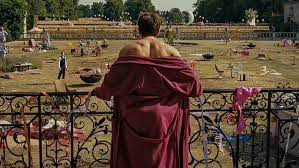Vote, It’s Your Right
Every four years in the United States of America, we the people vote on who shall be the “perfect” candidate to be the president of this country. Or that’s the idea.
US Citizens have the right to vote whoever they want into office, but voting turnouts are getting lower each presidential election. According to the United States Census Bureau, 61.8% of the voting age population voted in the 2012 presidential elections and in 2016, 61.4% voted during the presidential elections. With a country where both men and women have the ability to choose their leader, nearly 40% of the voting age don’t take advantage of that right. Why is that?
Most people believe that their vote doesn’t matter, but as a matter of fact, it does matter to both the candidate and the state you’re in. Christian Armstrong (11) was asked if your vote matters, his response, “Like everybody’s yes. Because it puts in which side the votes from the state go to.” Kayla Speas (12), also questioned, replies, “It matters because not only for the state but also for the people since they’re are people that are with you and will help the majority and think about what’s best for this country.” The U.S. uses the Electoral College, a system where the state electors vote for both President and Vice President. Marshall Rhodes (11) understands the system well by saying, “I would say it’s important because even if it technically doesn’t count because it’s an electoral college, you’re still showing America and all politicians what you think.” So does that mean our vote doesn’t matter because the state chooses? No, your vote still matters to this country and state.
When you vote, you’re not directly voting for the candidate you want, as the USA is only a representative democracy, not a true democracy. National Archives says, “You are telling your State which candidate you want your State to vote for at the meeting of electors.” Each State has a set number of electors, and they all come together and have a meeting on who to vote for based on the popular candidate that was voted for within that State. English teacher Kellie Peterson says, “So when I think about voting, I am aware that the State has a primarily dominant viewpoint. Like our State is known as a Red State or Republican. Mostly everyone votes Republican, besides the small pocket that’s Democratic.” Even though your vote doesn’t go towards the candidate you picked, it does help the State Electors, our senators and representatives, to know who their people want for their President. However, there is one more thing about the Electoral College: Electoral Votes.
Electoral Votes are points that go to the candidate that won the State to support them. The first candidate to reach 270 Electoral Votes wins the election. Each state has a different amount of points with California being worth 55, the highest, and Alaska, Vermont, and D.C. with only 3 electoral votes, the lowest. Our home state, Idaho, isn’t worth much for it only has 4 electoral votes. But who knows when those 4 points can come in handy to the candidates?
At a local scale, students here at Skyline also have this opportunity to vote for their president this year. However, mainly Seniors are more likely at the legal age, and some Juniors later this year will soon turn eighteen, which grants them the right to vote as well. This year’s candidates are a tough one since there’s mainly 3 Republicans, with Trump being the primary and well known, and 12 Democrats, only a handful are recognised, as of writing this article. So some students, and one teacher, were asked on who their vote is going for. Blade Hoffman (11) says, “Donald Trump all the way, brother. Because he’s taking the unemployment down more than the previous president has. He has taken the national debt down a little bit, but it’s still a crap ton.” US History teacher Dave Sanders is also voting for Trump. His reason, “. . . he’s done a good job despite being attacked. Well, the economy has improved, the judges [Trump] has put in, the stock market has rallied, wages are up, unemployment is down, there’s numerous of things.” Though, it seems that some students don’t know who to choose for their next president of the United States.”
Some students may feel something good, bad, or neutral about this coming election. Bryson Woolf (12) expresses, “It’s definitely interesting to say at least. It’s kind of weird because I hate everyone in the election so far on both sides. On the Republican side, It’s obvious that the prime candidate will be Trump and I generally don’t like Trump but he’s done some good things, but overall he’s still a horrible person. On the Democrat side, it’s, well, the reason I hate them is that they’re literally not saying anything about their political stands or anything like on certain topics.” That’s quite a lot to say about the elections this year coming from one student. Though some may not be very pleased about it. Trinity Arthur (11) says, “I feel like it’s all rigged. No matter who wins, we’re all doomed.” An interesting reaction on the 2020 reaction from a student. Others may say it’s one of the best ones, according to Matthew Schulze (11), “I feel like they’re the best options we have ever had. Mainly because our country it has had its bad times, but like the people who we have for the election have some sort of experience and they kind of know what’s going on.” Everyone does have their own take and reaction to the elections. In the end, whoever is elected president, we are still a nation that should remain united no matter the outcome.







